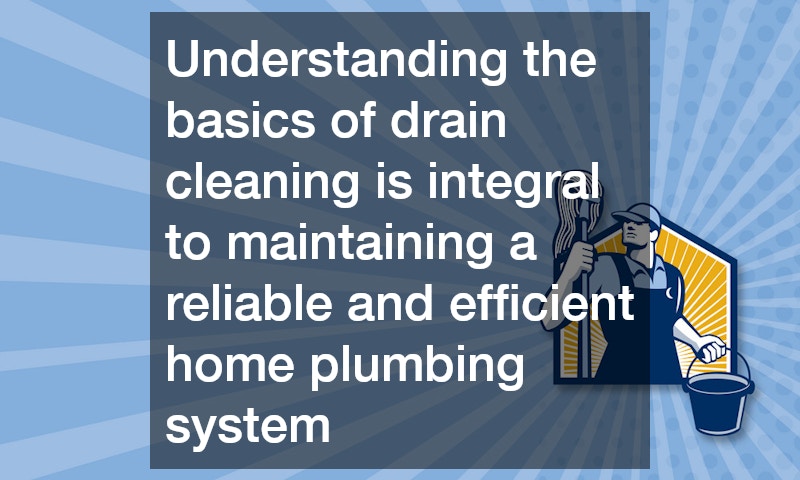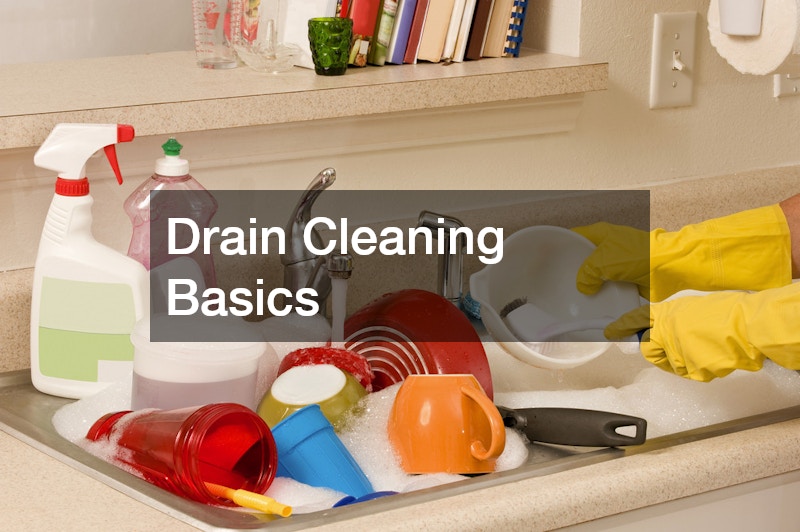Drain Cleaning Basics
Introduction
Maintaining a clear and efficient drainage system is crucial to prevent frequent clogs and potential plumbing emergencies. Regular drain cleaning not only safeguards your home’s plumbing system but also saves you from costly repairs and unpleasant inconveniences. Learning the basic tools and methods for effective drain cleaning can empower homeowners to address minor issues promptly.
What Causes Drain Clogs?
Common Culprits Behind Blockages
Drain clogs are often caused by a buildup of everyday materials that are mistakenly washed down the drain. Substances such as food particles, hair, soap scum, and grease are typical contributors to blockages. Understanding these common culprits helps in taking preventive actions to reduce their accumulation.
In kitchens, leftover food scraps that go down the sink can gradually obstruct pipes, especially when combined with grease. Bathrooms often suffer from hair and soap residue buildups, which stick to the walls of pipes and slow drainage. Regular inspection and maintenance can help identify potential clogs before they become severe.
One single hair can trap other debris in pipes, leading to slow water drainage, which is a clear sign of a clog. Investing in drain screens and being mindful about what goes down your drains can substantially alleviate the risk of developing blockages.
How Do You Unclog a Drain Naturally?
Environmentally Friendly Solutions
Natural remedies like baking soda and vinegar offer environmentally friendly solutions for unclogging drains. These household items are a safer alternative to harsh chemical drain cleaners, which can damage plumbing systems and pose environmental hazards. Utilizing natural solutions provides an effective approach to maintaining healthy drains.
A combination of baking soda and vinegar can be poured down the drain to react and break up minor clogs. This mixture acts by creating a fizz that loosens debris and dissolves organic matter, helping clear obstructions. Utilizing hot water afterward helps flush out any remaining particles, ensuring smoother water flow.
Using boiling water regularly can also help in preventing buildup in the first place. By adopting these green methods, you contribute to an eco-friendlier way of maintaining household plumbing systems, while also ensuring the longevity of your pipes and drains.
When Should You Call a Professional Plumber?
Signs of a Severe Drain Problem
Persistent clogs, foul odors, and slow drainage often indicate more significant underlying issues that need professional attention. When initial DIY attempts fail to resolve these problems, it might be time to call a plumber. Experienced plumbers have the expertise and tools necessary to diagnose and fix severe plumbing issues effectively.
If you notice water backing up from drains, continuous gurgling sounds, or multiple slow drains, these are strong indicators of a larger concern possibly linked to a sewer line blockage. Professional plumbers can utilize advanced techniques, such as hydro-jetting, which may not be accessible to homeowners, to address these issues thoroughly.
Timely professional intervention can prevent more damaging outcomes, such as water damage or unsanitary conditions resulting from persistent drain problems. Knowing when to call for help ensures that minor issues do not escalate into costly and more complex plumbing emergencies.
What Tools Do You Need for DIY Drain Cleaning?
Essential Equipment for Home Use
Equipping yourself with essential tools for DIY drain cleaning can help you tackle minor clogs effectively. A plunger, drain snake, and pipe wrench are basic tools that every homeowner should consider having. These tools provide a first line of defense against various drainage problems.
A plunger is versatile for clearing simple clogs in sinks, tubs, and toilets, using the power of suction and pressure. Drain snakes, or augers, are designed to reach and remove blockages that a plunger can’t displace, making them invaluable for deeper obstructions. Regular use of these tools can often resolve issues without needing professional intervention.
For more complex tasks, a pipe wrench might be required to disassemble pipes under sinks to remove stubborn clogs. By having these tools readily available, you can maintain the functionality of your drainage systems and extend the life of your plumbing installation.
How Can You Prevent Future Clogs?
Routine Maintenance and Best Practices
Regular maintenance and mindful practices can significantly reduce the risk of future clogs in your drainage system. Implementing a cleaning schedule can help remove any accumulating debris before it turns into a serious problem. Consistency in these habits is key to ensuring a hassle-free plumbing system.
Practicing responsible disposal of waste materials can prevent unnecessary strain on your drains. Avoid pouring grease down the sink and install strainers to catch food particles and hair. These preventive measures are simple yet effective strategies for maintaining clear and open drains.
Using natural cleaning agents periodically can help keep drains fresh and free-flowing. By investing a little time in routine cleaning and adopting better disposal practices, you protect your home from major plumbing issues and extend the lifespan of your plumbing infrastructure.
Conclusion
Understanding the basics of drain cleaning is integral to maintaining a reliable and efficient home plumbing system. By employing regular preventive measures, utilizing natural cleaning solutions, and knowing when to seek professional help, homeowners can avoid major drainage issues. Embrace these practices to ensure a well-functioning plumbing system and a healthier living environment.
.
Drain Cleaning Basics
Introduction
Maintaining a clear and efficient drainage system is crucial to prevent frequent clogs and potential plumbing emergencies. Regular drain cleaning not only safeguards your home’s plumbing system but also saves you from costly repairs and unpleasant inconveniences. Learning the basic tools and methods for effective drain cleaning can empower homeowners to address minor issues promptly.
What Causes Drain Clogs?
Common Culprits Behind Blockages
Drain clogs are often caused by a buildup of everyday materials that are mistakenly washed down the drain. Substances such as food particles, hair, soap scum, and grease are typical contributors to blockages. Understanding these common culprits helps in taking preventive actions to reduce their accumulation.
In kitchens, leftover food scraps that go down the sink can gradually obstruct pipes, especially when combined with grease. Bathrooms often suffer from hair and soap residue buildups, which stick to the walls of pipes and slow drainage. Regular inspection and maintenance can help identify potential clogs before they become severe.
One single hair can trap other debris in pipes, leading to slow water drainage, which is a clear sign of a clog. Investing in drain screens and being mindful about what goes down your drains can substantially alleviate the risk of developing blockages.
How Do You Unclog a Drain Naturally?
Environmentally Friendly Solutions
Natural remedies like baking soda and vinegar offer environmentally friendly solutions for unclogging drains. These household items are a safer alternative to harsh chemical drain cleaners, which can damage plumbing systems and pose environmental hazards. Utilizing natural solutions provides an effective approach to maintaining healthy drains.
A combination of baking soda and vinegar can be poured down the drain to react and break up minor clogs. This mixture acts by creating a fizz that loosens debris and dissolves organic matter, helping clear obstructions. Utilizing hot water afterward helps flush out any remaining particles, ensuring smoother water flow.
Using boiling water regularly can also help in preventing buildup in the first place. By adopting these green methods, you contribute to an eco-friendlier way of maintaining household plumbing systems, while also ensuring the longevity of your pipes and drains.
When Should You Call a Professional Plumber?
Signs of a Severe Drain Problem
Persistent clogs, foul odors, and slow drainage often indicate more significant underlying issues that need professional attention. When initial DIY attempts fail to resolve these problems, it might be time to call a plumber. Experienced plumbers have the expertise and tools necessary to diagnose and fix severe plumbing issues effectively.
If you notice water backing up from drains, continuous gurgling sounds, or multiple slow drains, these are strong indicators of a larger concern possibly linked to a sewer line blockage. Professional plumbers can utilize advanced techniques, such as hydro-jetting, which may not be accessible to homeowners, to address these issues thoroughly.
Timely professional intervention can prevent more damaging outcomes, such as water damage or unsanitary conditions resulting from persistent drain problems. Knowing when to call for help ensures that minor issues do not escalate into costly and more complex plumbing emergencies.
What Tools Do You Need for DIY Drain Cleaning?
Essential Equipment for Home Use
Equipping yourself with essential tools for DIY drain cleaning can help you tackle minor clogs effectively. A plunger, drain snake, and pipe wrench are basic tools that every homeowner should consider having. These tools provide a first line of defense against various drainage problems.
A plunger is versatile for clearing simple clogs in sinks, tubs, and toilets, using the power of suction and pressure. Drain snakes, or augers, are designed to reach and remove blockages that a plunger can’t displace, making them invaluable for deeper obstructions. Regular use of these tools can often resolve issues without needing professional intervention.
For more complex tasks, a pipe wrench might be required to disassemble pipes under sinks to remove stubborn clogs. By having these tools readily available, you can maintain the functionality of your drainage systems and extend the life of your plumbing installation.
How Can You Prevent Future Clogs?
Routine Maintenance and Best Practices
Regular maintenance and mindful practices can significantly reduce the risk of future clogs in your drainage system. Implementing a cleaning schedule can help remove any accumulating debris before it turns into a serious problem. Consistency in these habits is key to ensuring a hassle-free plumbing system.
Practicing responsible disposal of waste materials can prevent unnecessary strain on your drains. Avoid pouring grease down the sink and install strainers to catch food particles and hair. These preventive measures are simple yet effective strategies for maintaining clear and open drains.
Using natural cleaning agents periodically can help keep drains fresh and free-flowing. By investing a little time in routine cleaning and adopting better disposal practices, you protect your home from major plumbing issues and extend the lifespan of your plumbing infrastructure.
Conclusion
Understanding the basics of drain cleaning is integral to maintaining a reliable and efficient home plumbing system. By employing regular preventive measures, utilizing natural cleaning solutions, and knowing when to seek professional help, homeowners can avoid major drainage issues. Embrace these practices to ensure a well-functioning plumbing system and a healthier living environment.
.






